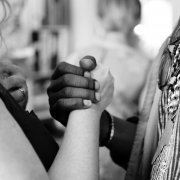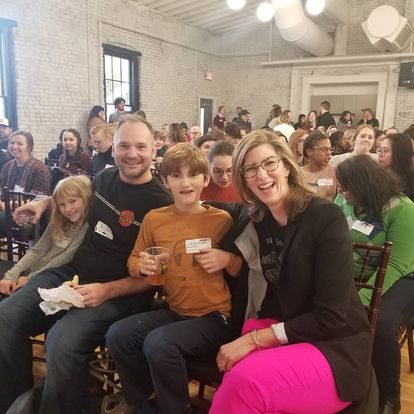Setting boundaries for personal growth.
Setting boundaries for personal growth is a crucial aspect of self-care and self-improvement. It involves recognizing our limits, understanding what is important to us, and establishing clear guidelines for how we want to be treated and how we want to treat others. By setting boundaries, we create a framework that allows us to prioritize our well-being, protect our energy, and cultivate healthy relationships.
Megan, Elizabeth and Britt discuss the limitations of New Year’s resolutions and how they often fail to bring about lasting change. They emphasize the importance of going beyond superficial goals and instead focusing on the deeper beliefs and values that shape our lives. Rather than simply making resolutions like going to the gym or spending less time on social media, they encourage listeners to examine their relationship with themselves, their friends, and their commitments.
Setting boundaries is a fundamental part of this process. It involves making commitments to ourselves and upholding those commitments without relying on others to do it for us. For example, if we want to spend less time on social media, it is our responsibility to set limits and create boundaries around our usage. Similarly, if we want to have more meaningful conversations with friends or family, it is up to us to initiate those conversations and prioritize quality time.
They also highlight the importance of setting emotional boundaries. They discuss situations where conversations become highly emotionally charged and unproductive. In such instances, it is crucial to recognize our limits and remove ourselves from the situation. By doing so, we give ourselves and others the space to calm down and process their emotions. This allows for more productive and constructive discussions to take place when everyone is in a calmer state of mind.
Setting boundaries for personal growth is not about controlling or manipulating others. It is about taking ownership of our own well-being and creating an environment that supports our growth and happiness. It requires self-awareness, self-compassion, and a willingness to communicate our boundaries clearly and assertively.
Set boundaries for self-care.
Setting boundaries for self-care is crucial in today’s fast-paced and interconnected world. It allows us to protect our mental and emotional well-being, maintain healthy relationships, and make time for personal growth and fulfillment.
Setting boundaries is an act of self-respect. It demonstrates that we value ourselves and our needs. By establishing clear guidelines for how we want to be treated and what we are willing to tolerate, we create a safe space for ourselves to thrive. This includes setting limits on how much time and energy we are willing to invest in certain activities or relationships. It means saying no when we feel overwhelmed or stretched too thin. By setting these boundaries, we communicate to others that our well-being is a priority.
Setting boundaries is essential for maintaining healthy relationships. It allows us to establish mutual respect and understanding with others. When we clearly communicate our boundaries, we give others the opportunity to respect and honor them. This fosters healthier and more balanced connections, as both parties are aware of each other’s limits and needs. By setting boundaries, we create space for open and honest communication, where both parties feel heard and respected.
Setting boundaries also creates room for personal growth and fulfillment. When we establish limits on how much time we spend on certain activities or with certain people, we free up time and energy for activities that align with our values and goals. This allows us to focus on our personal growth, pursue our passions, and engage in activities that bring us joy and fulfillment. By setting boundaries, we prioritize our own needs and desires, which ultimately leads to a more fulfilling and purposeful life.
However, setting boundaries for self-care can be challenging. Society often tells us that we “should” (shoulding all over ourselves) always be available and accessible, leading to feelings of guilt or obligation when we prioritize ourselves. Additionally, fear of conflict or disappointing others can hinder our ability to set and enforce boundaries. It is important to remember that setting boundaries is not selfish, but rather a necessary act of self-care. We cannot pour from an empty cup, and by prioritizing our own well-being, we are better equipped to show up for others.
Focus on self, set boundaries.
One aspect they highlight is the need to let go of how others take care of themselves and instead focus on our own well-being. This means not policing what others say or do, but rather taking responsibility for how we protect ourselves and what we allow into our lives. This can involve skills such as changing the subject, redirecting conversations, or reframing situations in a therapeutic language.
They also emphasize the importance of knowing our triggers and developing coping mechanisms to deal with them. They acknowledge that certain situations, such as significant changes in the workforce or personal life, can be challenging and anxiety-inducing. In these situations, it is essential to protect ourselves by setting boundaries and not succumbing to external pressures or expectations. They mention a senior in high school who is faced with the constant question of where he is going to college. Instead of succumbing to the pressure, he is taking his time to make a well-informed decision, considering factors such as finances and personal preferences.
A key point made is the concept of control and discerning what is within our control and what is not. Boundaries are framed around what we can control, which is primarily our own thoughts, emotions, and actions. By recognizing this distinction, we can focus on taking care of ourselves and not trying to control or change others.
Curiosity and vulnerability in conversations.
Curiosity and vulnerability are two key components of meaningful and transformative conversations. When we approach conversations with a genuine curiosity about others’ beliefs and perspectives, we create an opportunity for deeper understanding and connection. This curiosity opens the door for us to ask questions, listen attentively, and engage in a way that fosters empathy and mutual respect.
The women recount a conversation where one person asked a thought-provoking question about faith and belief. While the question may have caught the pastor’s kids off guard, it also sparked laughter and a shared understanding of the difficulty in discussing such topics. This highlights the vulnerability that comes with expressing our thoughts and beliefs, especially in areas that are deeply personal and often considered taboo.
Vulnerability in conversations requires courage and a willingness to expose our true selves. It means being open to the possibility of disagreement or criticism, but also the potential for growth and connection. The speaker in the podcast acknowledges that finding the vocabulary to describe or explain our inner thoughts and beliefs is hard work. It requires introspection and a willingness to articulate our ideas in a way that can be understood and engaged with by others.
Listen to this episode HERE!












